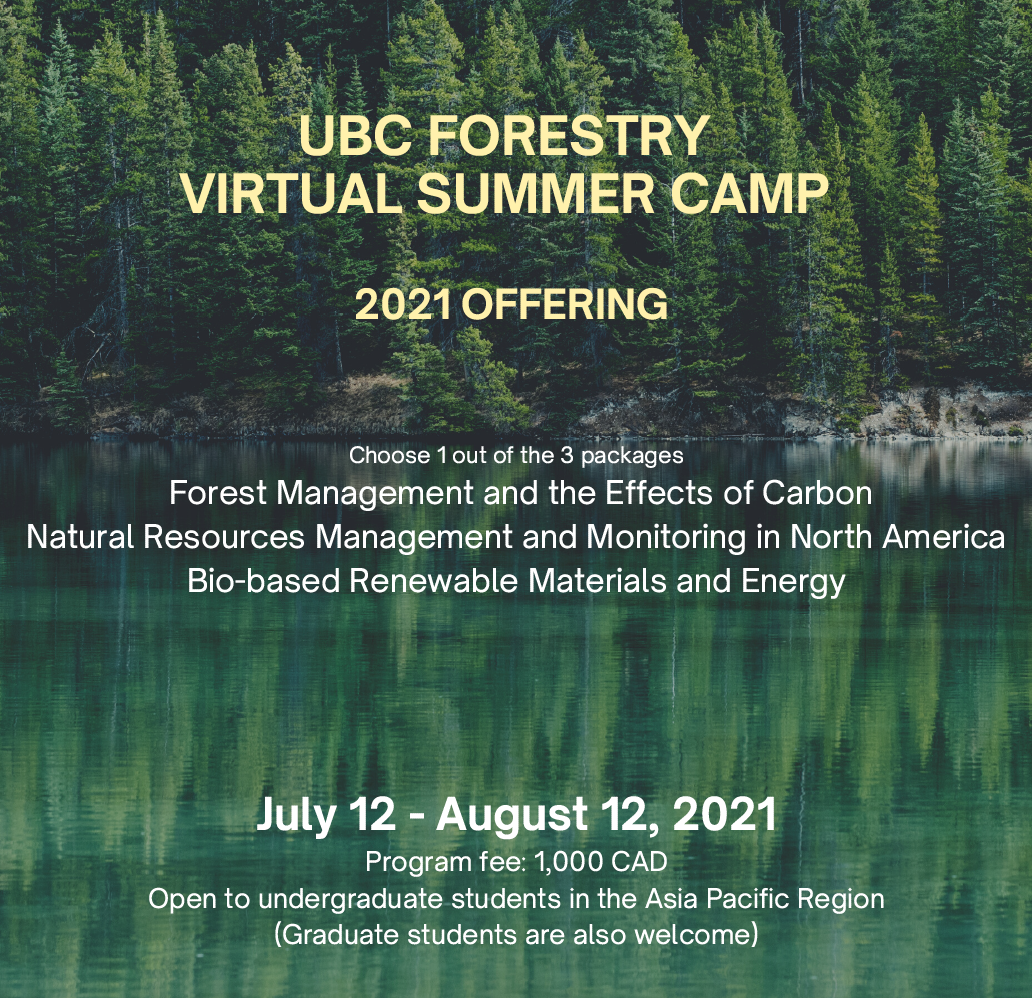Package I: Forest Management and the Effects of Carbon
Course A: Sustainable Forest Management in the Changing World (Dr. John Innes)
Course B: The Ecology, Economics, and Politics of Carbon (Dr. Clive Welham)
Key Topics:
Carbon ecology and management
Climate change and its socio-political implications
Forest management issues in local and international contexts
Course A: Sustainable Forest Management in the Changing World
Forests provide multiple ecosystem functions and services that are invaluable for human wellbeing. Yet, the world’s remaining forests are under increasing pressure due to human activities and climate change. In this course, students will learn theoretical and practical knowledge about the criteria and indicators that are being used worldwide to guide sustainable forest management practices and explain how these will vary in a changing climate. Students will watch online lecture videos, live interactive discussions with the world’s renowned professors and experts, and conduct group discussions with global peers during the four weeks. To translate knowledge into practice, students will have various hands-on experience ranges from analyzing case studies to evaluating sustainable forest management worldwide using globally used criteria and indicators.
By the end of this course, students will be able to:
- Explain the principles of sustainable forest management.
- Apply the principles of sustainable forest management within the context of climate change.
- Compare and assess the major components of sustainable forest management.
- Develop critical thinking and communication skills
Dr. John Innes is a professor at the UBC Faculty of Forestry and the Forest Renewal BC Chair in Forest Management. In 2007, he was part of the Intergovernmental Panel on Climate Change team (IPCC) that shared the Nobel Peace Prize with Al Gore. He is also the author of the book “The Wicked Problem of Forest Policy”.
Course B: The Ecology, Economics, and Politics of Carbon
Climate change is the greatest threat to humanity due to higher carbon dioxide and other greenhouse gases concentration in the atmosphere. In this course, students will learn about ecology, economics, and politics of carbon and how it can be efficiently managed. Students will interact with the scholar, watch online videos, and conduct group discussions with peers from all over the world during the four weeks. To translate knowledge into practice, students will have various hands-on experiences analyzing carbon impact in your society and country to group video projects on the embedded carbon cost of everyday items you have used.
By the end of this course, students will be able to:
- Describe carbon cycle and greenhouse effect and analyze the impact of CO2 and other greenhouse gases (Ecology of Carbon)
- Describe monetary cost and value attached to carbon and analyze ways to reduce emission (Economics of Carbon)
- Describe and analyze natural-based solutions to climate change
- Discuss national and international agreements to restrict CO2 emissions (Politics of Carbon)
- Develop critical thinking and communication skills
Dr. Clive Welham is a Research Associate in the Department of Forest Resources Management in UBC Faculty of Forestry. He developed many forest carbon projects in Canada and other countries. He helped construct a methodology (set of rules) used by an international organization, the Verified Carbon Standard, as the basis for carbon projects. He is also the founder of 3GreenTree Ecosystem Services and the president of FORRx Consulting.
Package II: Natural Resources Management and Monitoring in North America
Course A: Natural Resources Management in North America (Dr. Peter Marshall)
Course B: Natural Resources Monitoring in North America (Dr. Nicholas Coops)
Key Topics:
Natural resources classifications and policies
Conservation methods, challenges and ecological integrity
Remote sensing principles and applications
Course A: Natural Resources Management in North America
Dr Peter Marshall is the Professor and Program Director of the ForestResources Management Program. He has over thirty years of teaching experience, and his research interests include sampling design and stand dynamics, particularly of complex stands. In 2005, Dr Marshall was awarded the Canadian Forestry Achievement Award. Currently, he is a council member of the Association of BC Professional Foresters.
Course B: Natural Resources Monitoring in North America
Dr. Nicholas Coops is a professor in the Department of Forest Resource Management in UBC Faculty of Forestry and the Canada Research Chair in Remote Sensing. He was recently awarded the world’s most prestigious forestry donor, the Marcus Wallenberg Prize-known as the “Novel Prize of Forest Research”. Currently, Dr. Coops leads the Integrated Remote Sensing Studio at UBC.
Package III: Bio-based Renewable Materials and Energy
Course A: Bioenergy and Biofuels (Dr. Jack Saddler)
Course B: Bio-based Materials (Dr. Scott Renneckar)
Key Topics:
Biofuel classifications and production
Bio-based polymers synthesis, physical and chemicalproperties, and biodegradability
Bio-based polymers processing techniques and applications
Course A: Bioenergy and Biofuels
This course provides an overview of bioenergy principles and explains the knowledge base as well as the cutting-edge technologies for the bioenergy and biofuels production. It consists of five modules in which students will learn the bioenergy and biofuels classification, biomass chemistry, biofuel production via biomass thermochemical conversion, biofuel production via biomass biochemical conversion as well as the life cycle analysis utilized in the biofuels commercialization.
By the end of this course, the students should be able to:
- Describe different bioenergy and biofuel forms and how these biofuels can replace a substantial amount of conventional energy sources such as oil, gas and coal;
- Describe the importance of biomass as a renewable resource for both energy production generally, and transportation fuels specifically;
- Manage the lignocellulosic biomass chemistry and its applications in the biofuel related research;
- Be familiar with several different conversion technologies to produce various biofuels (e.g. bio-oil, bioethanol, biobutanol and biodiesel etc.);
- Understand the advantages and disadvantages of these different bioenergy form; and
- Understand the concept of product life cycle analysis and technical economic analysis.
Dr John (Jack) Saddler is the endowed Professor of Forest Products Biotechnology/Bioenergy (originally an NSERC Industry Chair) and Dean Emeritus, Faculty of Forestry at UBC. He is a Fellow of the Royal Society of Canada. He has received other awards such as the 2016 Linneborn award from the European Bioenergy Organization, the International Union of Forest Research Organizations (IUFRO’s) Scientific Achievement Award etc. He is the Task Leader of the Liquid Biofuels network of IEA Bioenergy and the BC-SMART consortium. He is also a member of the Markus Wallenberg Prize selection committee, the forest sectors Nobel Prize.
Course B: Bio-based materials
This course is designed to equip students with fundamental knowledge on the existing primary biobased polymeric materials. The course will start to introduce general aspects including how nature synthesizes these biobased polymers, their physical and chemical properties, and biodegradability. This course will cover transformations biobased polymers for industrial polymer processing techniques and highlight the primary applications of nature derived polymers in our daily life and the potential for use in new applications based on polymer structure property relationships.
Upon completion of this course, successful students will be able to:
- Identify the primary bio-based polymeric materials existing in everyday life;
- Understand the chemical structures and physical properties of bio-based materials;
- Differentiate bio-based polymers from synthetic ones;
- Explain bio-based polymers synthesis and their transformation into bioproducts;
- Evaluate both social and economic advantages in using biopolymers;
- Understand chemical reactions to modify and/or synthesize new biopolymers with targeted
- properties and functionalities; and
- Interpret the challenge in replacing synthetic polymer and the limitation of bio-based polymer
Dr Scott Renneckar is a Professor and the Program Director of the Forest Bioeconomy Science and Technology program in the Department of Wood Science in UBC Faculty of Forestry. He is also the Canada Research Chair in Advanced Renewable Materials. His research areas include bio-based nanomaterials, bio-products, carbohydrate chemistry, forest biorefineries, polymerchemistry, and sustainability.
Scan QR code for Apply
You could also register the program by Clicking Here
Contact Information
UBC Asia Forest Research Centre
Associate Dean: Dr. Guangyu Wang
(guangyu.wang@ubc.ca)
Program facilitators:
Package I – Dr Anil Shrestha (anil.shrestha@ubc.ca)
Package II – Ms Kalifi Ferretti-Gallon (kalifi.ferretti-gallon@ubc.ca)
Package III – Dr Joanna Zhong (na.zhong@ubc.ca)







